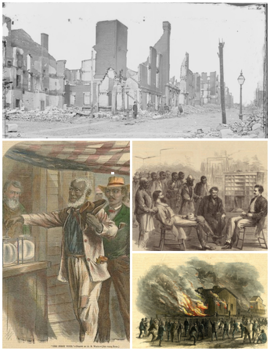Reconstruction era

The ruins of Richmond, Virginia after the American Civil War, newly freed African Americans voting for the first time in 1867, Office of the Freedmen's Bureau in Memphis, Tennessee, Memphis Riots of 1866
|
|
| Date | January 1, 1863 to March 31, 1877 (14 years, 2 months and 30 days) |
|---|---|
| Location | United States, Southern United States |
| Also known as | Reconstruction; Radical Reconstruction |
The term Reconstruction Era, in the context of the history of the United States, has two senses: the first covers the complete history of the entire country from 1865 to 1877 following the American Civil War (1861 to 1865); the second sense focuses on the attempted transformation of the Southern United States from 1863 to 1877, as directed by Congress, with the reconstruction of state and society.
Three visions of Civil War memory appeared during Reconstruction: the reconciliationist vision, which was rooted in coping with the death and devastation the war had brought; the white supremacist vision, which included terror and violence; and the emancipationist vision, which sought full freedom, citizenship and Constitutional equality for African Americans.
From 1863 to 1865, Presidents Abraham Lincoln and Andrew Johnson both took moderate positions designed to bring the South back to normal as quickly as possible, while the Radical Republicans used Congress to block any moderate approaches, impose harsh terms, and upgrade the rights of the freedmen. Johnson followed a lenient policy toward ex-Confederates much like Lincoln's. Lincoln's last speeches show that he was leaning toward supporting the enfranchisement of all freedmen, whereas Johnson was opposed to this.
Johnson's interpretations of Lincoln's policies prevailed until the Congressional elections of 1866 in the North, which enabled the Radicals to take control of policy, remove former Confederates from power, and enfranchise the freedmen. A Republican coalition came to power in nearly all the southern states and set out to transform the society by setting up a free labor economy, using the U.S. Army and the Freedmen's Bureau. The Bureau protected the legal rights of freedmen, negotiated labor contracts, and set up schools and churches for them. Thousands of Northerners came South as missionaries, teachers, businessmen, and politicians; hostile elements called them "Carpetbaggers". Rebuilding the rundown railroad system was a major strategy, but it collapsed when a nationwide depression (called the Panic of 1873) struck the economy. The Radicals in the House of Representatives, frustrated by Johnson's opposition to Congressional Reconstruction, filed impeachment charges but the action failed by one vote in the Senate. In early 1866, Congress passed the Freedmen's Bureau and Civil Rights Bills and sent them to Johnson for his signature. The first bill extended the life of the bureau, originally established as a temporary organization charged with assisting refugees and freed slaves, while the second defined all persons born in the United States as national citizens who were to enjoy equality before the law. After Johnson vetoed the bills–causing a permanent rupture in his relationship with Congress that would culminate in his impeachment in 1868–Congress overrode his veto, making the Civil Rights Act the first major bill in the history of the United States to become law through an override of a presidential veto.
...
Wikipedia
